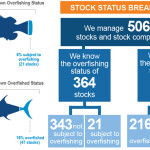The Marine Stewardship Council (MSC) needs to address major concerns raised during an inquiry that looked into the effectiveness of the eco-label and the fishery certification scheme, recommends a new report published by the United Kingdom’s House of Commons’ Environmental Audit Committee (EAC).
EAC opened its Sustainable Seas inquiry in April 2018 to consider the future of oceans. The inquiry focused on how marine life can be protected from climate change, overfishing, and pollution, and how the U.K. government can create a more sustainable blue economy. One of its oral evidence sessions focused specifically on the MSC, with the participation of MSC CEO Rupert Howes.
In the inquiry, the MSC was criticized for recertifying a tuna fishery where there had been evidence of illegal shark finning dating back as recently as 2015.
“To ensure continued consumer confidence in the MSC certification, we recommend the MSC addresses specific criticisms raised… into its five-year review and strengthens its standard accordingly. These criticisms include its unit of assessment, the need to factor in carbon from ships into its standard, concerns about shark finning (where we look forward to the publication of data verifying the reduction of this practice in 2019) and barriers to entry for small scale fisheries. The review should be transparent and ideally independently evaluated,” stated the report.
The EAC’s recommendations have been welcomed by the On the Hook campaign, which has repeatedly called for an independent review of the MSC Standard and its application.
“An independent review would offer the best possible opportunity to deal with issues highlighted by stakeholders, including unit of assessment and shark finning, and ensure the future credibility of the MSC eco-label. I look forward to hearing the MSC’s plans and timeframe for such a review,” said On the Hook spokesman Callum Roberts.
The MSC has also voiced its approval of EAC’s report. In a statement, Erin Priddle, U.K. program director, said that it was good to see the committee raising the important issues of ocean plastics and acidification.
“Far too often, our seas have been treated as ‘out of sight, out of mind.’ We hope that this report will galvanize action in securing a healthy future for our oceans," Priddle said.
“The report reflects the complex, often polarized views around seafood certification. While some claim the bar is too low, others warn that it is ‘becoming too high even for world leading fisheries.’ This illustrates the challenge of a global standard: if the bar is raised too high, it risks preventing fisheries – such as small scale and developing world fisheries – from ever reaching that bar,” she added.
The MSC’s statement also highlighted that unit of assessment, the holistic assessment of fisheries, shark finning, and barriers to entry for small-scale fisheries were all being addressed in the Fisheries Standard Review currently underway, or in separate consultations taking place in 2019.
“We acknowledge that there are some who have concerns about aspects of the MSC program, or doubts about individual certifications. We take these concerns seriously and are grateful for all contributions which will help to strengthen the MSC Standard. We look forward to working with all involved in the coming weeks and months to listen to their contributions and, through this review and the potential updates to the standard, reassure them of the program’s rigor,” said Priddle.
With regards to the recommendation in the EAC report that the concerns of Prof. Roberts and others should be addressed through the established process of the five-yearly Fishery Standard Review, the MSC said that in the most recent GSSI review, it had met all the essential components of the GSSI benchmark, and a further 63 supplementary components relating to issues such as deepsea fishing, vulnerable marine ecosystems and data collection to demonstrate impact.
It also said that in the current (fourth) review of the MSC Standard, it had already welcomed input from WWF, Roberts, and others, and would continue to invite them to engage with the MSC during the consultation process.
“MSC is deeply aware of the ever-changing political and environmental landscape. We are committed to understanding these changes and the interaction they have with our standard. While there will always be those demanding short-term, or immediate change, the inquiry has recognized that the MSC has a well-established process to make changes to the standard that includes the voices of all stakeholder,” said Priddle.
U.K. government now has to consider the report and formally respond to its findings and recommendations.






